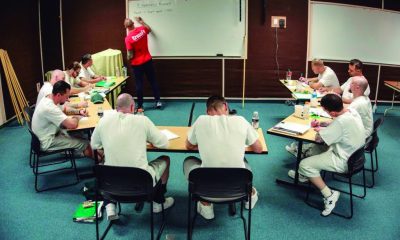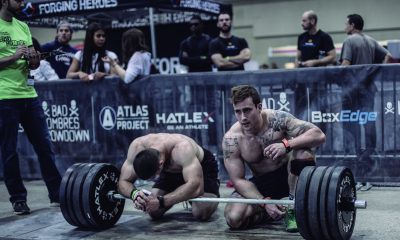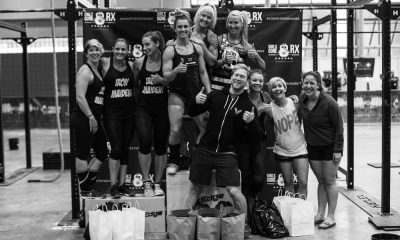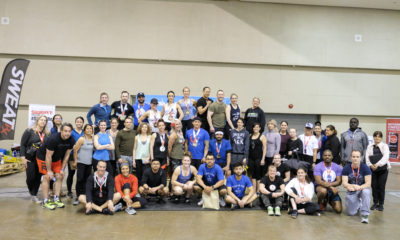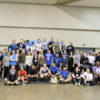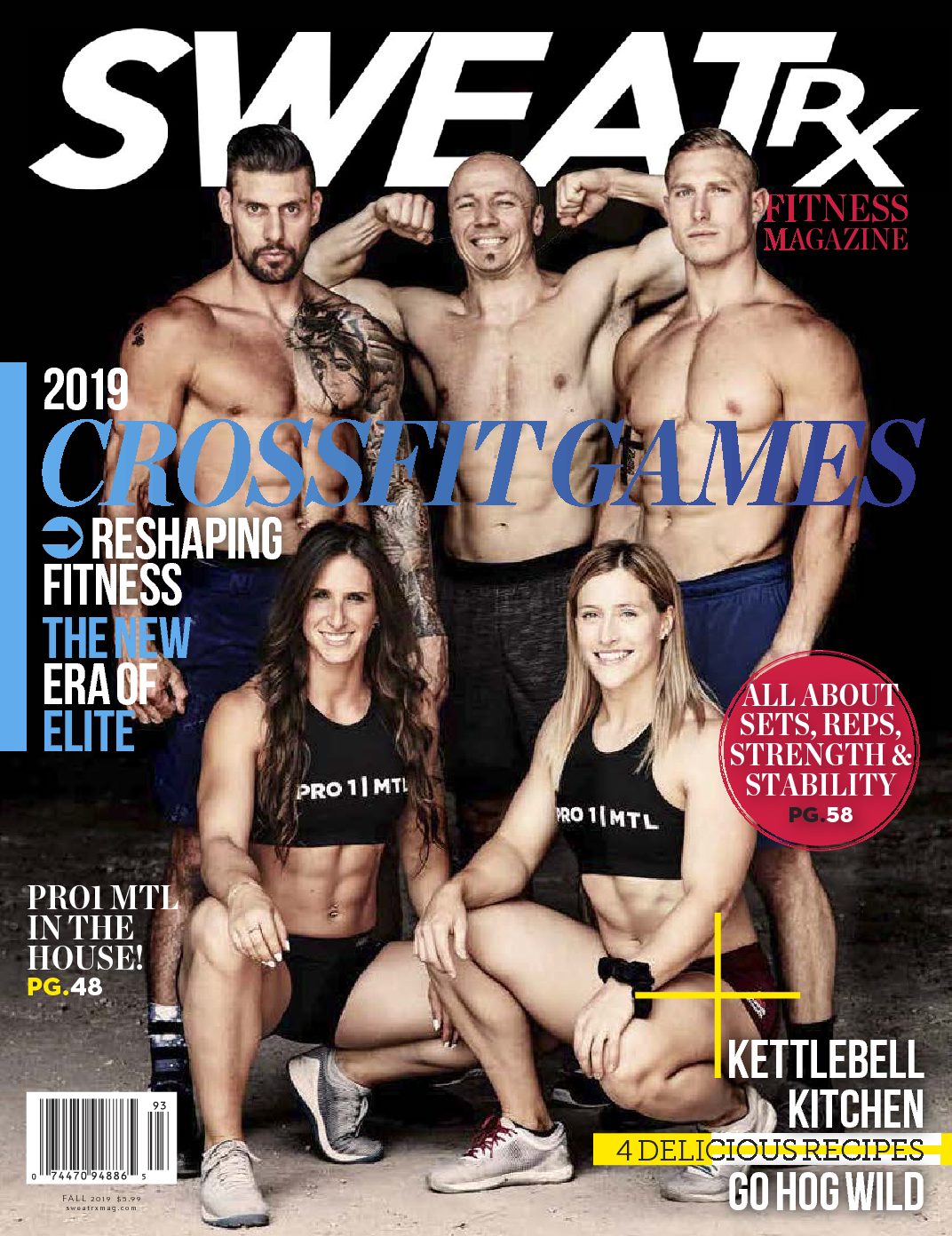Community
Mens Sana in Corpore Sano
DeMel Tarver shares his secrets for developing a sound mind and healthy body
At 6-feet-5-inches tall and 230 pounds of rock-solid muscle, DeMel Tarver’s body looks more like that of a professional basketball player than a philosopher. However, while the 34-year-old strength and conditioning coach played college ball and did a stint in the semi-professional ABA, he left the sport at age 28 to pursue a career in personal training.
“I wanted to get off that basketball court and focus on training—specifically, teaching athletes and non-athletes how to use their bodies more efficiently,” says Tarver. Over time, that life purpose evolved into something more. “I’m not your typical trainer,” he adds. “I want to give people something beyond the ability to do a squat correctly.”
The custom programs he designs for clients of his personal training business, Prime Performance Strength Training and Conditioning in Fort Collins, Colorado, obviously help them reach their physical goals. However, Tarver also uses knowledge from studying martial arts, Chinese philosophy, spirituality, metaphysics, psychology, and other disciplines to help clients balance their minds.
“Nowadays, people are looking for a quick fix. They want to rush through all these different types of workouts, and they end up getting hurt really fast,” he says. “I teach them to slow down and understand how their mind and body have the ability to connect and progress.” The process ultimately allows them to improve other aspects of their lives—from their marriages to their businesses—as they develop physical and cardiovascular strength.
We recently sat down with Tarver in-between clients—on a day when he wasn’t squatting 505 pounds, deadlifting 675 pounds, or front squatting 430 pounds—to discuss the five basic components of his philosophy. Whether you’re a new CrossFitter or a Games athlete, he believes these principles will help you improve your performance both in and out of the box.
1. Awareness
The first step Tarver takes when meeting any new client is asking them to honestly assess their strengths, weaknesses, stressors, and any physical or psychological injuries they may have. Because these factors always affect both state of mind and physical performance, Tarver believes awareness is necessary before you can tackle a CrossFit WOD (or any other training program) in a way that will encourage personal development.
“The quality of your training should not be measured against anyone else,” he says. “Maybe you can lift 100 pounds maximum and I can lift 700 pounds maximum. What’s the difference? You have your body type and I have mine. They are completely different, and yet they are the same.” It doesn’t matter if you consider yourself a non-athlete or an athlete, either. “I’m here to help people understand that we all have the same dynamic ability to run, jump, swim, and climb,” he says. “But you have to do it based on you—your workout and your workout only.”
2. Breathing
“I came across this quote the other day,” says Tarver. “It said, ‘If you know the art of breathing, you have the strength, wisdom, and courage of ten tigers.’ I’m a firm believer in breathing because I know how it can intensify everything.” Unfortunately, most of Tarver’s new clients have no idea how to breathe correctly.
He says, “People breathe wrong all the time. Why? Because they have so many extracurricular activities going on in their minds that they’ve lost focus. They are hyperventilating and their heart rate has increased because they don’t have control.” Proper breathing—including slowing down inhalations and exhalations—is one of the first things he teaches his clients.
“If you have the ability to control your use of oxygen, you’re going to better understand the movements of your body—you can then think before you act and will have complete efficiency and control of how your body moves,” he says, adding, “Your mind will also become clearer.”
Breathing is important in every WOD and when doing Olympic lifts with heavy weights. “Take the front squat,” says Tarver. “When you do a front squat, you need to breathe through your mouth so you can hold all that weight on your chest. If you breathe through your nose, all of that oxygen will go to your lower back and you won’t have the stability necessary in your upper body to be able to control weight in that motion.”
3. Fear
Fear of failure is an inhibiting factor Tarver sees in far too many people’s lives. Not only does it keep them out of the gym or box, it also prevents them from making other positive changes. “A lot of people put fear and hesitation out there rather than going towards their goal,” he says. “They don’t want to be disappointed so they just go with the flow.”
He coaches his clients to view what they may consider a failure—be that an incomplete attempt at a lift, a slow race time, or a missed promotion at work—as a theoretical success instead. “You have to fail in training to learn,” he says. “You’re not going to come out and get a 400-pound clean and jerk on day one.”
He encourages CrossFitters to set aside ego and pride and forget about the white board. “Only then can you build from the ground up,” he says. “You will find a deeper quality within yourself that can overcome fear, adapt to adversity, and work towards theoretical success. There are lessons to be learned in everything.”
4. Fundamentals
From the simple act of sitting to the progression of movements required to complete an Olympic lift, Tarver believes fundamentals are essential in training. Whether his clients are new to fitness or professional athletes, the development of foundational body mechanics—at a slower pace—is always part of his programming.
“I like to slow everybody down so they can reconnect and get their fundamentals correct,” he says. “If you get your fundamentals correct, then you can walk, jog or sprint, lift light weight, medium weight, or heavy weight.”
Taking the time to connect body and mind in every exercise is especially important for CrossFitters. This requires slowing down, something that’s admittedly difficult during speed WODs. However, “I believe slowing down can improve the quality of any CrossFit athlete,” says Tarver.
5. Repetition
The final component of Tarver’s training philosophy is repetition—continuing with your program no matter what. “Keep allowing yourself to grow,” he says. “Sure, life is going to throw a wrinkle in here and there, but how will you respond to that adversity? It isn’t always a negative thing, and if you want to improve, you’re going to have to develop a taste for it. That will get you to the top of the hill, where you will notice there are more hills. It is never ending; it does not stop.”
This goes for setting PRs as well. “If you set a personal record, you’re entitled to feel happy,” he says. “At the same time, you have to understand there is still somewhere to improve beyond that. You’re constantly going to get better. It may not be a linear progression; you are going to fail and you are going to succeed—but you will get there.”
His career is a daily joy for Tarver, one that he believes can eventually help to create a better world. “I believe we have such an ability to control the essence of our own souls that it will affect the people around us and create better people in that sense,” he says. His final words of wisdom? “Improve your sets and repetitions by all the things you do. Appreciate the ability you have to constantly learn and grow, and apply it towards training so you don’t lose the nourishment of your own progression towards the achievement of your goals.”






